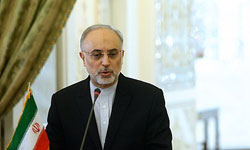Group 5+1 Adamant to Accept Iran’s Nominees for Hosting Talks


Iranian Foreign Minister Ali Akbar Salehi announced on Wednesday that the world powers have rejected Tehran’s offer to hold the next round of talks in Egypt.
“I made the proposal to the Egyptian officials during the Cairo visit and they announced their readiness to host the next round of negotiations (between Tehran and the world powers), but the other side (the world powers) should also accept the offer as well,” Salehi said in a joint press conference with his Omani counterpart Yusuf bin Alawi in Tehran today.
“But the Group5+1 (the five permanent UN Security Council members plus Germany) has not accepted the proposal until today, perhaps due to certain considerations,” he added.
Asked about the media reports about the possibility of holding talks in Kazakhstan late in February, Salehi said, “The venue and date of the negotiations have not been exactly specified until this moment.”
In relevant remarks on Monday Salehi also dismissed the western states’ claims that Tehran is killing time in resuming talks with the G5+1, stressing the country’s readiness for negotiations with the world powers.
“We have always announced that we are ready for negotiations until reaching a result,” Salehi told reporters in Addis Ababa on the sidelines of the 20th Summit of the African Union (AU).
He said that Iran was never the side which withdrew from the negotiations and it is always prepared for talks.
Asked about the reason for the postponement of the January talks between Iran and the world power to an unspecified time, Salehi said the G5+1 should be blamed for it.
Iran has proposed Egypt to host the negotiations which was welcomed by the officials in Cairo but the G5+1 didn’t accept this proposal and said “it is interested in holding the negotiations in another place”, he added.
He also said half a dozen countries have offered to host the negotiations.
“Kazakhstan, Sweden, Switzerland and Turkmenistan have proposed to host the next round of negotiations,” Salehi said.
Asked if Turkey is also seen by Tehran as a potential host for the talks, the Iranian foreign minister said, “Turkey is considered as one of our best options and we don’t have any problem” with its hosting the talks.
The last round of talks between Iran and the five permanent members of the UN Security Council plus Germany was held in Moscow in June.
Earlier this month, Iran’s top negotiator in talks with the world powers Saeed Jalili had said Tehran and the Group 5+1 would resume talks later this month, although the place and date for the negotiations have not been finalized.
Jalili told reporters in New Delhi that Tehran has agreed to a new round of talks this month.
“We have accepted that these talks should be held in January … but till now the details have not been finalized,” he said.
But in a telephone conversation with Undersecretary of Iran’s Supreme National Security Council (SNSC) Ali Baqeri earlier this month, Deputy of EU Foreign Policy Chief Helga Schmid said that they are not ready to negotiate with Iran this month.
Schmid is the number two of EU foreign policy chief Catherine Ashton, who represents the G5+1 group in talks with Iran.
Iran’s deputy chief negotiator, for his part, said that Iran is ready to attend the talks and asked the group to remain committed to the date agreed upon for talks in January.
Washington and its Western allies accuse Iran of trying to develop nuclear weapons under the cover of a civilian nuclear program, while they have never presented any corroborative evidence to substantiate their allegations. Iran denies the charges and insists that its nuclear program is for peaceful purposes only.
Tehran stresses that the country has always pursued a civilian path to provide power to the growing number of Iranian population, whose fossil fuel would eventually run dry.
Despite the rules enshrined in the Non-Proliferation Treaty (NPT) entitling every member state, including Iran, to the right of uranium enrichment, Tehran is now under four rounds of UN Security Council sanctions for turning down West’s calls to give up its right of uranium enrichment.







